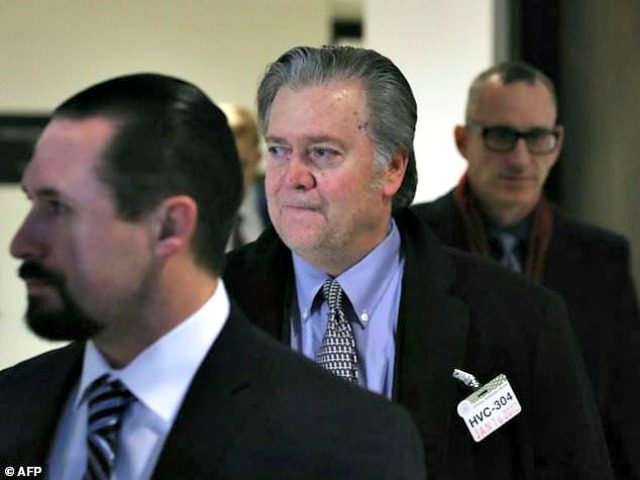A showdown between the White House and Congress exploded with the appearance of former White House Chief Strategist Stephen K. Bannon in front of one of the committees conducting a Russia probe on Tuesday.
The showdown lasted more than 10 hours, with Bannon going into a secure room in the Capitol to meet with House intelligence committee investigators at 9:30 a.m., and finally emerging at around 8:00 p.m.
During the interview, Bannon refused to answer questions not related to the campaign, since the congressional probe is investigating Russian meddling in the 2016 elections and whether the Trump campaign colluded with Russians.
In an extraordinary move, the committee issued two subpoenas on him while he was in the interview, to try to force him to answer all of their questions about the Trump transition period as well as the Trump administration and to provide documents.
It emerged later that the White House had instructed Bannon not to talk about anything other than the campaign, even after the subpoena. During the interview, Bannon’s attorney, Bill Burck, was on the phone with the White House counsel relaying questions in real time, to see whether he could answer the question, according to the Associated Press.
The committee has requested that the former chief strategist and Breitbart News executive chair reappear on Thursday.
After the interview, Democrats and some Republicans ridiculed the White House’s claim of broad executive privilege, breaking usual protocol of remaining quiet about closed-door interviews related to the probe and talking freely to reporters afterward.
“I am frustrated whenever people assert privileges that do not exist,” House intelligence committee member Rep. Trey Gowdy (R-SC) told Fox News on Wednesday.
“And I am really frustrated when witnesses have all the time in the world to talk to the media on- and off-the-record and they can help people write books, but they can’t talk to the representatives that are elected by their fellow citizens,” Gowdy said, in reference to Bannon’s comments to Fire and Fury author Michael Wolff.
Bannon reportedly downplayed those comments to Wolff during the interview, calling them “hyperbole.”
During the interview, lawmakers went after Bannon with viciousness — some Republicans even more so than Democrats, according to sources familiar with the interview.
Most of the 10.5-hour interview focused on periods after the campaign, the sources said. Lawmakers questioned Bannon on Trump’s firing of former FBI Director James Comey, although Bannon was not present when that decision was made.
Democrats and Trump critics argue that the firing was an attempt to quash the Russia investigation, and therefore, an “obstruction of justice,” even though Trump was reportedly advised that doing so would not end the Russia investigation.
Comey had refused, despite repeated requests from Trump, to inform the American people that Trump was not a target of the FBI’s initial investigation.
In Trump’s letter firing Comey, he stated that Comey had told him on three different occasions he was not under investigation. After Comey was fired, the former director admitted leaking a memo to the media with the purpose of prompting a special counsel investigation. The special counsel is reportedly looking into whether Trump obstructed justice with his decision.
Lawmakers also questioned Bannon on the Trump administration’s drafting a statement about Donald Trump Jr.’s meeting with Russian lawyer Natalia Veselnitskaya on June 9, 2016. The White House learned that news of the meeting would be published by New York Times while they were overseas in Germany for the G-20 meeting.
On the flight back to Washington, Trump dictated a statement that said the meeting was about Russian adoptions. Present at the time were Hope Hicks, Jared Kushner, Ivanka Trump, and their communications person Josh Raffel.
Veselnitskaya had talked to Trump Jr., and others at the meeting about the Magnitsky Act — a U.S. law that sanctions Russian corruption and prompted Moscow to ban U.S. adoptions of Russian children. But Trump critics claim the statement was misleading, since emails later showed the meeting was set up on the premise that Veselnitskaya had dirt on Hillary Clinton.
Trump Jr. later said she had nothing to give to them on Clinton and there was no follow-up, and Veselnitskaya has said she requested the meeting to lobby against the Magnitsky Act.
Bannon was not part of the discussion when the statement was being drafted, but investigators are reportedly hoping to use his statements to check against other Trump administration officials.
There were also some questions about the firing of former National Security Adviser Michael Flynn for allegedly lying to Vice President Michael Pence that he did not discuss Obama administration sanctions with Russian Ambassador Sergei Kislyak.
Trump tweeted that he fired Flynn because he lied, which critics say showed that he knew Flynn had broken a law when he allegedly asked Comey to go easy on him during the investigation. Trump’s lawyer, John Dowd, later said he was the one who drafted the erroneous tweet, not the president.
What did not come up that much, according to sources, was the issue of collusion. There has been no evidence to date of any collusion by the Trump campaign with Russia — other than an unverified and salacious dossier funded by the Clinton campaign and the Democratic National Committee.
Mueller’s issuance of a grand jury subpoena indicates he does not consider Bannon to be a target of the probe, since targets are subpoenaed in front of a grand jury only in rare circumstances. The AP reported Wednesday that Bannon would speak to the special counsel team in a closed door setting instead.
The same fight over executive privilege is expected to play out with another Trump campaign aide and current White House staffer, Rick Dearborn, who is interviewing with the committee on Wednesday. Trump’s early campaign manager Corey Lewindowski, who is also interviewing with the committee Wednesday but only served during the campaign and not in the administration, is expected to avoid that fight.

COMMENTS
Please let us know if you're having issues with commenting.